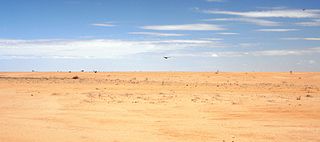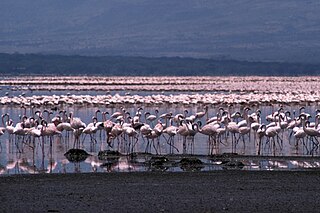Related Research Articles

The Demographics of Kenya is monitored by the Kenyan National Bureau of Statistics. Kenya is a multi-ethnic state in East Africa. Its total population was at 47,558,296 as of the 2019 census.

Kenya, officially the Republic of Kenya, is a country in East Africa. With a population of more than 47.6 million in the 2019 census, Kenya is the 28th-most-populous country in the world and 7th most populous in Africa. Kenya's capital and largest city is Nairobi, while its oldest and second-largest city, is the major port city of Mombasa, situated on Mombasa Island in the Indian Ocean and the surrounding mainland. Mombasa was the capital of the British East Africa Protectorate, which included most of what is now Kenya and southwestern Somalia, from 1889 to 1907. Other important cities include Kisumu and Nakuru. Kenya is bordered by South Sudan to the northwest, Ethiopia to the north, Somalia to the east, Uganda to the west, Tanzania to the south, and the Indian Ocean to the southeast.

Lake Turkana is a saline lake in the Kenyan Rift Valley, in northern Kenya, with its far northern end crossing into Ethiopia. It is the world's largest permanent desert lake and the world's largest alkaline lake. By volume it is the world's fourth-largest salt lake after the Caspian Sea, Issyk-Kul, and Lake Van, and among all lakes it ranks 24th.

Lokichogio, is a town in the Turkana District in northwest Kenya. It is often called Loki for short. The town lies on the A1 road, and is served by the Lokichogio Airport.

The Ik people are an ethnic group or tribe native to northeastern Uganda, near the Kenyan border. Primarily subsistence farmers, most Ik live in small clan villages, or odoks, in the area surrounding Mount Morungole in the Kaabong district. Their population is estimated between 10,000 and 15,000. The word Ik means "head of migration"; they are traditionally believed by locals to have been some of the region's earliest settlers from Kenya.

Mijikenda are a group of nine related Bantu ethnic groups inhabiting the coast of Kenya, between the Sabaki and the Umba rivers, in an area stretching from the border with Tanzania in the south to the border near Somalia in the north. Archaeologist Chapuruka Kusimba contends that the Mijikenda formerly resided in coastal cities, but later settled in Kenya's hinterlands to avoid submission to dominant Portuguese forces that were then in control. Historically, these Mijikenda ethnic groups have been called the Nyika or Nika by outsiders. It is a derogatory term meaning "bush people."
Bukusu is a dialect of the Masaba language spoken by the Bukusu tribe of the Luhya people of western Kenya. It is one of several ethnically Luhya dialects; however, it is more closely related to the Gisu dialect of Masaaba in eastern Uganda than it is to other languages spoken by the Luhya.
The Swahili people comprise mainly Bantu, Afro-Arab, and Comorian ethnic groups inhabiting the Swahili coast, an area encompassing the Zanzibar archipelago and mainland Tanzania's seaboard, littoral Kenya, northern Mozambique, the Comoros Islands, and northwest Madagascar.

In Uganda, the most spoken language in the capital city is Luganda, followed by English, as all schools in Uganda use it in their studies due to the introduction of English during the colonial period. English is also the language of business and judicial matters. Most spoken after Luganda and English is Swahili. This language is more common in neighbouring Kenya and Tanzania. Swahili is taught in schools as an optional additional language and it is mostly spoken by the Ugandan army. In 2005, there were talks to include Swahili as the second official language as it was seen as neutral, however this is still not ratified by the government. Swahili is used among some communities bordering South Sudan and Kenya.

Moyale is a city situated on the border between Ethiopia and Kenya. In Ethiopia, it serves as the administrative centre for two Ethiopian woredas: Moyale of the Oromia Region and Moyale of the Somali Region. In Kenya, it is the largest town in Marsabit County and the capital of Moyale sub-county.

The Meru or Amîîrú are a Bantu ethnic group that inhabit the Meru region of Kenya. The region is situated on the fertile lands of the north and eastern slopes of Mount Kenya in the former Eastern Province.

Homa Bay is a town on the south shore of Winam Gulf of Lake Victoria, in western Kenya. It lies near Mount Homa and Ruma National Park, the latter noted for Jackson's hartebeests and roan antelope.

The Turkwel River is a river flowing from Mount Elgon on the border of Kenya and Uganda to Lake Turkana. The river is called the Suam River from its source to the border at Turkana County of Kenya. The name Turkwel is derived from the Turkana name for the river, Tir-kol, which means a river that "withstands the wilderness". The Turkwel begins on the lush green slopes of Mount Elgon and the Cherangani Hills, then traverses the Southern Turkana Plains, crosses the Loturerei Desert near Lodwar and empties into the world's largest desert lake, Lake Turkana. The river's flow is seasonally varied, and flash floods in the rainy season also occur at times.
Digo (Chidigo) is a Bantu language spoken primarily along the East African coast between Mombasa and Tanga by the Digo people of Kenya and Tanzania. The ethnic Digo population has been estimated at around 360,000, the majority of whom are presumably speakers of the language. All adult speakers of Digo are bilingual in Swahili, East Africa's lingua franca. The two languages are closely related, and Digo also has much vocabulary borrowed from neighbouring Swahili dialects.
Translators without Borders (TWB) is a non-profit organization set up to provide translation services for humanitarian non-profits. It was established in 2010 as a sister organization of Traducteurs Sans Frontières, founded in 1993 by Lori Thicke and Ros Smith-Thomas. As of 2022, it had over 100,000 members. TWB's objective is to address language disparities that impede crucial humanitarian efforts. They aim to accomplish this by facilitating collaboration between non-profit humanitarian entities and a volunteer community of translators.

The Chalbi Desert is a small desert in northern Kenya near the border with Ethiopia. It is east of Lake Turkana and contains North Horr. Marsabit is the closest major urban center.
Nyole is a Bantu language spoken by the Luhya people in Vihiga District, Kenya. There is 61% lexical similarity with a related but different Nyole dialect in Uganda.
Ik is one of the Kuliak languages of northeastern Uganda. The Kuliak languages form their own branch of the proposed Nilo-Saharan language family. With the other two Kuliak languages being moribund, Ik may soon be the sole remaining language of its family.

The Great Rift Valley is part of an intra-continental ridge system that runs through Kenya from north to south. It is part of the Gregory Rift, the eastern branch of the East African Rift, which starts in Tanzania to the south and continues northward into Ethiopia. It was formed on the "Kenyan Dome", a geographical upwelling created by the interactions of three major tectonics: the Arabian, Nubian, and Somalian plates. In the past, it was seen as part of a "Great Rift Valley" that runs from Madagascar to Syria. Most of the valley falls within the former Rift Valley Province.
Kenyan Australians are Australian citizens and residents of Kenyan origin and descent. They may be of indigenous African, European, or Indian heritage.
References
- ↑ Schrock, Terrill. 2014. A grammar of Ik (Icé-tód): Northeast Uganda's last thriving Kuliak language, p.2. Doctoral dissertation, Rijksuniversiteit te Leiden.